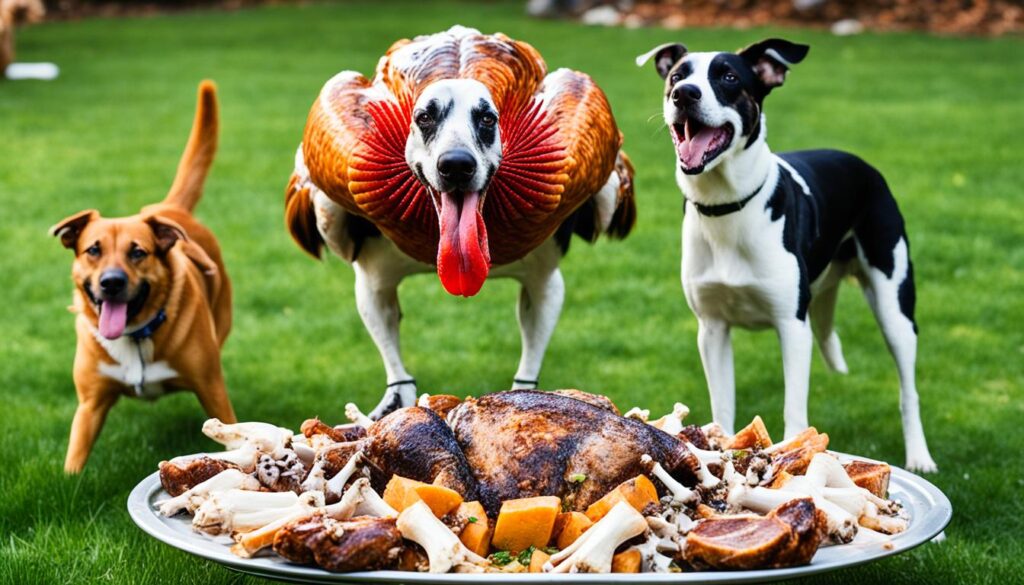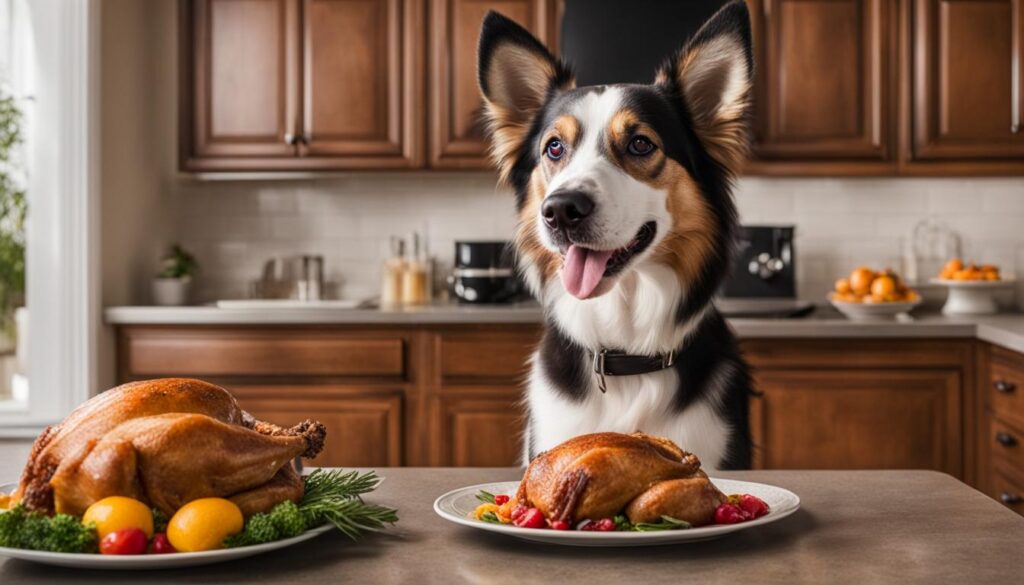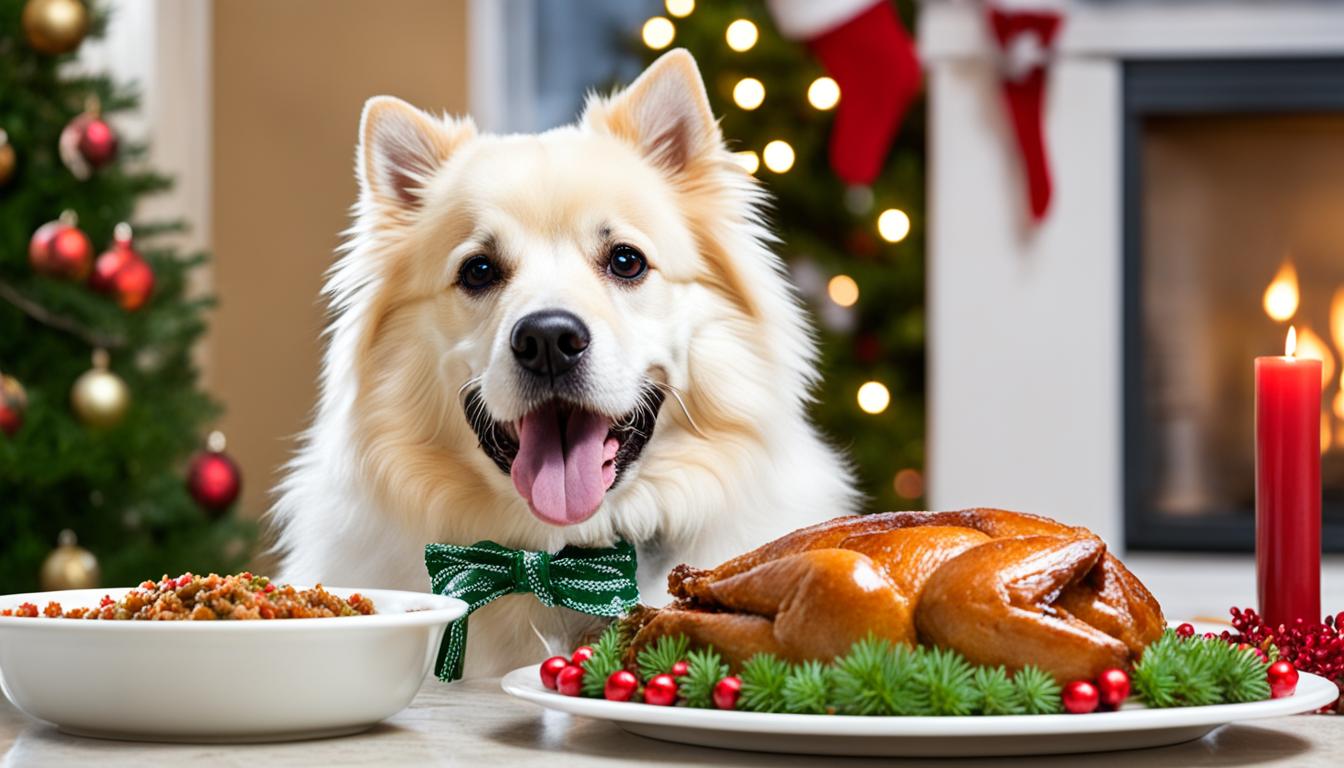As an Amazon Associate I earn from qualifying purchases.
Thanksgiving is just around the corner, and your furry friend is eagerly awaiting a taste of the holiday feast. As you prepare your festive spread, you wonder if it’s safe to share some turkey with your beloved canine companion. You want to ensure that your dog can partake in the holiday spirit without any risk to their health.
Well, the good news is that dogs can indeed eat turkey, but there are a few things to consider to keep them safe and healthy. Let’s dig into the facts together and uncover the dos and don’ts of feeding turkey to your furry friend.
Key Takeaways:
- While dogs can eat turkey, it’s crucial to feed them plain, unseasoned meat without any fatty additives.
- Avoid giving dogs turkey skin, bones, or any ingredients used to prepare holiday turkey, such as seasonings, garlic, and onions.
- Make Thanksgiving pet-friendly by offering small quantities of plain turkey meat and avoiding other harmful foods like ham and fatty dishes.
- Never let your dog consume turkey bones, as they can cause choking or serious internal injuries.
- Consult with a veterinarian if you have any concerns or questions about feeding turkey to your dog.
How to Make Thanksgiving Pet-Friendly: Dog-Friendly Thanksgiving Dishes and Pet Safety Tips
In order to ensure a pet-friendly Thanksgiving, it’s crucial to follow some safety guidelines and provide your furry friends with dog-friendly dishes. By keeping holiday pet safety in mind, you can create a welcoming and enjoyable Thanksgiving experience for your four-legged companions.
“Thanksgiving is a time to come together and celebrate with our loved ones, including our beloved pets. By taking some simple precautions and offering them delicious and safe dishes, we can show our furry friends how grateful we are to have them in our lives.”
First and foremost, it’s important to keep food scraps to a minimum. While it may be tempting to share tasty morsels with your pup, it’s essential to avoid feeding them foods that can be harmful to their health. Instead, focus on offering small quantities of turkey meat that has been prepared without any seasonings or fatty additives.
Be sure to remove the turkey skin, as it can be difficult for dogs to digest and may cause gastrointestinal discomfort. Additionally, make sure there are no bones attached to the meat, as turkey bones can splinter easily and pose a choking hazard.
When preparing a dog-friendly Thanksgiving meal, it’s crucial to avoid feeding your furry friend any other Thanksgiving foods that may be harmful to them. Foods such as ham, fatty dishes, and foods with spices and seasonings can upset their stomachs or even be toxic to dogs. Instead, opt for pet-safe foods like apples, green beans, sweet potatoes, and plain turkey meat.
Pet-Friendly Thanksgiving Dish Ideas:
- Apple slices: A crunchy and refreshing treat that can also provide your dog with essential vitamins and fiber.
- Green beans: A nutritious vegetable your pup can enjoy either raw or lightly steamed.
- Sweet potatoes: A tasty and healthy snack packed with vitamins and fiber.
- Plain turkey meat: As mentioned earlier, plain, unseasoned turkey meat can be a safe and healthy choice for your dog.
Remember, when it comes to holiday pet safety, it’s better to err on the side of caution. If you’re unsure about the safety of a particular food, it’s best to consult with your veterinarian before offering it to your dog.
By following these pet-friendly Thanksgiving practices and offering your dog delicious and safe dishes, you can ensure that they feel included in the festivities while keeping their health and well-being a top priority.
| Thanksgiving Foods to Avoid Feeding Your Dog: | Safe Alternatives for Dogs: |
|---|---|
|
|
Why Dogs Shouldn’t Eat Turkey Bones: Dangers and Risks
Feeding turkey to dogs can be a wonderful treat, but it is essential to be aware of the potential dangers associated with turkey bones. Whether cooked or raw, turkey bones should never be given to dogs. These bones, like other poultry bones, are brittle and can easily splinter when chewed or swallowed.
Swallowing or chewing on turkey bones can cause serious harm to your furry friend. The risk of choking is high, and these bones can also lead to internal injuries, such as perforation of the stomach or intestines. It’s simply not worth the risk.
If you want to satisfy your dog’s desire for something to chew on, it’s always best to opt for safe bone alternatives or bone treats that are specifically designed for dogs. These alternatives provide a safe and enjoyable chewing experience without the risks associated with turkey bones.
Dogs rely on us to keep them safe and make the right choices when it comes to their diet and well-being. By avoiding turkey bones altogether, you can ensure that your canine companion stays healthy and free from harm.

The Dangers of Turkey Bones
“Giving your dog turkey bones is like playing a dangerous game of chance. The risks simply outweigh any potential benefits. Avoid the temptation and choose safer alternatives instead.”
Safe Bone Alternatives for Dogs
When it comes to giving your dog something to chew on, there are plenty of safe options available. Here are a few alternatives to turkey bones:
- Natural rubber or nylon chew toys
- Dental chews specifically designed for dogs
- Antlers from deer or elk
- Rawhide alternatives made from safe and digestible materials
These alternatives provide a satisfying chewing experience and can help keep your dog’s teeth clean and healthy without the risks associated with turkey bones.
Comparison of Turkey Bones and Safe Bone Alternatives
| Turkey Bones | Safe Bone Alternatives |
|---|---|
| Can splinter easily | Designed to withstand chewing |
| Risk of choking | Less chance of choking |
| Potential for internal injuries | No risk of internal injuries |
| Offer little to no nutritional value | May provide dental benefits |
Note: The table provides a comparison between turkey bones and safe bone alternatives for dogs. It is clear that safe bone alternatives are a much better choice when it comes to your dog’s well-being.
Can Dogs Eat Turkey: Addressing Common Concerns
While turkey can be a delightful addition to your furry friend’s Thanksgiving feast, it’s important to address some common concerns to ensure a pet-friendly celebration. Let’s take a look at a few key considerations:
Fat Content and Health Conditions
Some pet owners may worry about the fat content in turkey and its potential impact on dogs with specific health conditions, such as heart problems or high blood pressure. While it’s true that fatty turkey skin and added oils can be harmful, there are ways to make sure your pup can still enjoy a tasty turkey treat.
Remember, it’s all about moderation. Ensure you remove the skin and any fatty additives, and opt for lean, plain turkey meat in small quantities. This way, you can indulge your pup without compromising their well-being.
Allergies and Sensitivities
Another concern is the possibility of allergies or sensitivities to turkey or other poultry products. Just like humans, some dogs may experience adverse reactions to certain foods. If you suspect your pup has a poultry-related issue, it’s best to consult with your veterinarian to determine the appropriate course of action.
While it’s always better to be safe than sorry, keep in mind that allergies to turkey are relatively rare in dogs. However, if your pet has a known allergy or sensitivities to poultry, it’s best to avoid introducing turkey into their diet.
If you’re unsure whether your dog can safely enjoy turkey, a veterinarian will provide expert guidance based on your dog’s specific needs and health conditions.
| Common Concerns | Recommendations |
|---|---|
| Fat content | Remove skin and fatty additives, serve lean plain turkey meat in moderation |
| Allergies and sensitivities | Consult with a veterinarian and avoid turkey if your dog has known poultry-related issues |
Remember, every dog is unique, and it’s crucial to consider their specific dietary needs and health conditions when deciding whether to incorporate turkey into their meal. By addressing common concerns and seeking professional advice when needed, you can ensure a safe and enjoyable Thanksgiving for your beloved furry companion.
How to Safely Feed Turkey to Your Dog: Precautions and Recommendations
To safely feed turkey to your dog, you need to be cautious and follow some simple recommendations. Remember, a happy dog is a dog with a full tummy, so here’s how you can make sure your furry friend enjoys a safe and delicious Thanksgiving feast.
Offer Small Amounts and Remove Skin, Fat, and Bones
“Less is more” is the golden rule when it comes to feeding your dog turkey. Give them small amounts of plain turkey meat without any seasoning, removing all skin, fat, and bones. This will ensure they get a healthy, lean protein boost without any potential hazards.
Avoid Onions and Other Harmful Additives
While plain turkey is safe for dogs, there are certain ingredients that can be toxic to them. Onions, in particular, are a big no-no. So, make sure you’re not serving your dog any turkey that has been cooked with onions. It’s better to be safe than sorry!
Consider Allergies and Sensitivities
Just like humans, dogs can have allergies or sensitivities to certain foods. If your dog has never had poultry before or has a history of allergies, it might be best to skip the turkey altogether. Opt for other dog-safe Thanksgiving foods, such as apples, green beans, or sweet potatoes, that won’t cause any discomfort or health issues.
Consult with Your Veterinarian
If you have any concerns or questions about feeding turkey to your dog, don’t hesitate to consult with your veterinarian. They can provide you with the best advice based on your dog’s individual needs and health conditions. Your vet is your dog’s best friend when it comes to their nutrition and overall well-being.
Remember, a happy and healthy Thanksgiving for your dog starts with safe and mindful feeding practices. Follow these precautions and recommendations, and you can enjoy the holiday feast knowing your furry friend is happily wagging their tail.

Safety Precautions for Feeding Turkey to Dogs
| Precautions | Recommendations |
|---|---|
| Offer small amounts | “More nap, less gobble.” Serve portions appropriate to your dog’s size and dietary needs. |
| Remove skin, fat, and bones | “Safety first, flavor second.” Ensure that the turkey meat is free from any potential hazards that could harm your dog. |
| Avoid onions and harmful additives | “Skip the seasoning, not the taste.” Keep your dog’s Thanksgiving plate free from any toxic ingredients like onions. |
| Consider allergies and sensitivities | “Happy tummy, happy dog.” If your dog has allergies or sensitivities, choose alternative dog-safe Thanksgiving foods. |
| Consult with your veterinarian | “A vet’s advice is better than a guess.” Seek guidance from your veterinarian for personalized recommendations and concerns. |
Keep Your Dog Safe During Thanksgiving: Tips for Pet-Friendly Celebrations
Apart from food considerations, it is important to keep your dog safe during Thanksgiving celebrations. While it may be tempting to share your delicious feast with your furry friend, it’s crucial to remember that certain foods can be harmful to them. In addition, the hustle and bustle of the holiday can sometimes create a chaotic environment for your pet. Follow these pet-friendly Thanksgiving practices to ensure a safe and enjoyable holiday for your canine companion:
Create a Safe Space for Your Dog
With all the excitement and activity happening during Thanksgiving, it’s essential to provide your dog with a calm and quiet space to retreat to. This can be a designated room or area where they can relax away from the noise and commotion. Make sure this space is comfortable, with their bed or favorite blanket, toys, and fresh water.
Store Food Safely
Thanksgiving leftovers can be enticing for your dog, but many of the foods we enjoy during the holiday can be dangerous for them. It’s crucial to store all food and leftovers safely and out of your dog’s reach. Keep them securely wrapped and stored in a latched container in the fridge or pantry. It may also be helpful to remind guests not to share food directly with your dog, as they may unknowingly offer something that can be harmful to them.
Mindful of Decorations
While decorating your home for Thanksgiving, be mindful of the decorations you choose, especially those that can be hazardous if chewed or swallowed by your dog. Avoid placing decorations within their reach, such as low-hanging ornaments or fragile items that can break easily. Additionally, be cautious with decorative plants, as some can be toxic to pets if ingested.
Minimize Stressful Situations
Thanksgiving can be a busy and chaotic time, which can be overwhelming for your dog. To minimize stress, consider keeping them away from the kitchen during meal preparation and cooking, as well as during the noisy and crowded moments of the gathering. Providing them with their safe space and a familiar routine can help them feel more secure and relaxed.
By implementing these pet-friendly Thanksgiving practices, you can ensure that your dog stays safe and stress-free during the holiday festivities. Remember, their well-being should always be a top priority. If you have any concerns or questions about holiday pet safety, consult with your veterinarian for professional advice tailored to your dog’s specific needs.
Conclusion
In conclusion, let’s recap what we’ve learned about dogs and turkey during Thanksgiving. Yes, dogs can enjoy turkey, but it’s crucial to prepare it the right way. Stick to plain, unseasoned turkey meat without any fatty additives to keep your furry friend healthy. Remember, turkey skin, bones, and the ingredients used during holiday cooking, such as seasonings, garlic, and onions, are a big no-no for dogs.
To ensure a pet-friendly Thanksgiving, consider offering your dog specially prepared dog-friendly dishes. It’s important to keep food scraps to a minimum and offer only small quantities of plain turkey meat, free from skin and bones. Avoid feeding your dog other Thanksgiving foods that may be harmful to them, like ham, fatty foods, or foods with spices and seasonings. Opt for safe alternatives like apples, green beans, sweet potatoes, or plain turkey meat instead.
While turkey can be a healthy addition to your dog’s diet, always prioritize holiday pet safety. Store food and leftovers securely to prevent accidents or your four-legged friend gobbling up something they shouldn’t. Be mindful of decorations that can be hazardous if chewed or swallowed, and ensure your dog has a calm and quiet space to retreat to if things get overwhelming. By following these pet-friendly practices, you can enjoy a safe and enjoyable Thanksgiving with your beloved pup.
If you ever have concerns or questions about feeding turkey or any other foods to your dog, don’t hesitate to consult with a veterinarian. They will provide you with the best advice tailored to your dog’s specific needs. Remember, your dog’s health and happiness are the main ingredients for a truly memorable Thanksgiving celebration.
FAQ
Can dogs eat turkey?
Is turkey safe for dogs during Thanksgiving?
What should I avoid feeding my dog on Thanksgiving?
Can dogs eat other Thanksgiving foods?
Why shouldn’t dogs eat turkey bones?
What are some concerns when feeding turkey to dogs?
How can I safely feed turkey to my dog?
How can I make Thanksgiving pet-friendly for my dog?
How can I keep my dog safe during Thanksgiving celebrations?
Source Links
- https://www.thepioneerwoman.com/home-lifestyle/pets/a40787263/can-dogs-eat-turkey/
- https://www.localpawpals.com/gobble-gobble-are-turkey-bones-safe-as-dog-treats/
- https://www.verifythis.com/article/news/verify/holiday-verify/which-thanksgiving-foods-are-safe-toxic-pets/536-c3094f83-544c-45a7-951b-6d883dd0eb45
As an Amazon Associate I earn from qualifying purchases.

